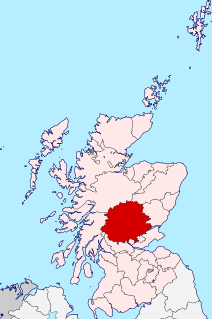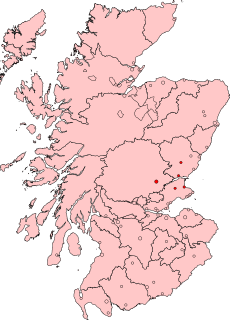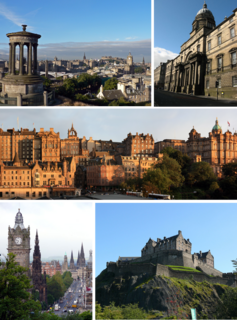Colonel the Honorable Donald Ogilvy (27 May 1788 – 30 December 1863) [1] of Clova in Forfarshire was a Scottish politician.

Clova is a village in Glen Clova, Angus, Scotland. It lies on the River South Esk, some 12 miles north of Kirriemuir.
Ogilvy's father, who had inherited estates in both Forfarshire and Perthshire, styled himself the 5th Earl of Airlie. The title which had been attainted twice, through the family's involvement in both the Jacobite rising of 1715 and 1745 rising. The attainder was lifted in 1826, allowing Donald's other brother David to resume the title. [2]

Perthshire, officially the County of Perth, is a historic county and registration county in central Scotland. It extends from Strathmore in the east, to the Pass of Drumochter in the north, Rannoch Moor and Ben Lui in the west, and Aberfoyle in the south. It was a local government county from 1890 to 1930.

Earl of Airlie is a title in the Peerage of Scotland, created on 2 April 1639 for James Ogilvy, 7th Lord Ogilvy of Airlie, along with the title Lord Ogilvy of Alith and Lintrathen. The title Lord Ogilvy of Airlie had been created on 28 April 1491.
In English criminal law, attainder or attinctura was the metaphorical "stain" or "corruption of blood" which arose from being condemned for a serious capital crime. It entailed losing not only one's life, property and hereditary titles, but typically also the right to pass them on to one's heirs. Both men and women condemned of capital crimes could be attainted.
Ogilvy joined the army of East India Company in 1804, but was not promoted, so settled in Scotland first in Fettercairn, and then from 1820 at Clova. At the 1830 general election he contested the Perth Burghs, losing to John Stuart-Wortley. Wortley was unseated on petition, but the resulting by-election was contested by Ogilvy's brother William Ogilvy. [2]

The East India Company (EIC), also known as the Honourable East India Company (HEIC) or the British East India Company and informally as John Company, Company Bahadur, or simply The Company, was an English and later British joint-stock company. It was formed to trade in the Indian Ocean region, initially with Mughal India and the East Indies, and later with Qing China. The company ended up seizing control over large parts of the Indian subcontinent, colonised parts of Southeast Asia, and colonised Hong Kong after a war with Qing China.

Perth Burghs was a district of burghs constituency of the House of Commons of the Parliament of Great Britain from 1708 to 1801 and of the Parliament of the United Kingdom from 1801 until 1832, representing a seat for one Member of Parliament (MP)
Donald was elected at a by-election in October 1831 as the Member of Parliament (MP) for Forfarshire, at a by-election following the sitting MP William Maule's elevation to the peerage. [2] However, he was unseated on petition in January 1832, [1] and did not stand for Parliament again. [2]

William Ramsay Maule, 1st Baron Panmure was a Scottish landowner and politician.
In the 1830s he is listed as living at 4 Atholl Crescent in Edinburgh's West End. [3]

Edinburgh is the capital city of Scotland and one of its 32 council areas. Historically part of the county of Midlothian, it is located in Lothian on the Firth of Forth's southern shore.





